Long-time followers of Vivy Yusof will know that the fashion-forward entrepreneur started her journey as a blogger.
So, when Vivy hit the 10-year mark of being an entrepreneur and wanted to share her colourful experiences, her medium of choice was naturally the written word.
Published in December 2022, Vivy Yusof’s The First Decade: My Journey from Blogger to Entrepreneur explores many never-before-told stories from Vivy.
“There are so many things entrepreneurs don’t talk about publicly—how to start, fundraising challenges, scaling up challenges, international expansion, and all the mistakes along the way,” Vivy told Vulcan Post.
“I hope me talking about it will help other entrepreneurs out there, and maybe even invite others to talk about their own journeys.”
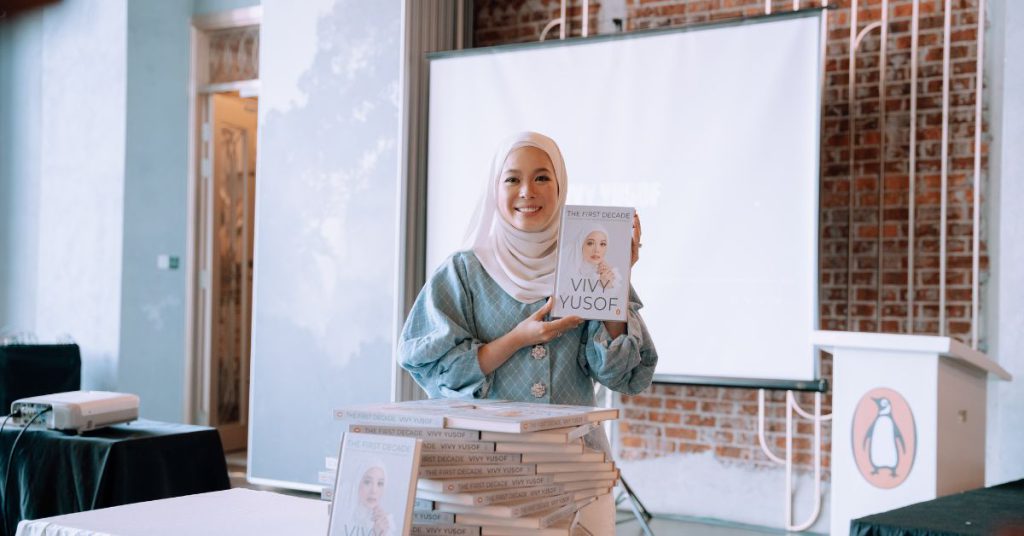
Even after reading the book, though, we still had many burning questions about her, so we reached out to ask them.
Here’s what Vivy had to say in response.
How has the book been received?
As the book was published by Penguin, it meant The First Decade would receive worldwide distribution.
According to Vivy, when the preorders for her book started, the orders received were so high that bookstores started to take more interest.
“Then, after a couple weeks it launched into the market, it hit the Bestseller List in all major bookstores, including Amazon!” Vivy added.
While all this is definitely a good thing, it also means Vivy’s story would be open for even more scrutiny by a wider audience.
When asked if she was worried at all about how people would respond to her content, Vivy revealed that she indeed had her fair share of concerns.
“I worried if people would not like the book and worried about airing my flaws out there, but I reminded myself that this was bigger than me,” she expressed.
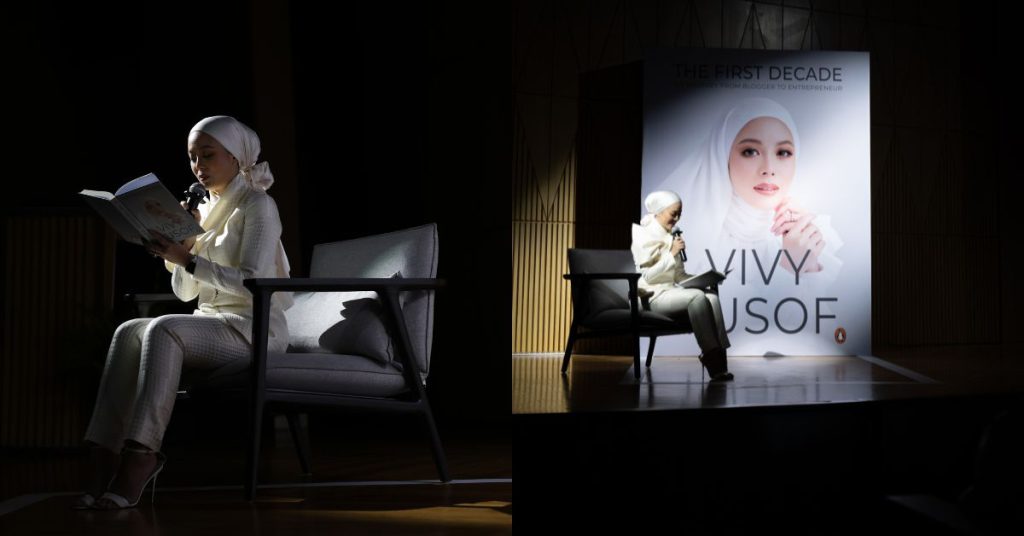
She continued, “I wanted to share to young people especially a glimpse of what it’s like to be an entrepreneur, because more often than not, social media gives only a fraction of the beautiful highlights. The uglier parts, the mistakes, the pains, the navigating the unknown parts—people don’t talk about that much, so I wanted to do it.”
What would she change about her past decade?
Throughout the book, Vivy candidly addresses issues and mistakes she made as an entrepreneur, particularly with FashionValet.
So, knowing what she knows now, would she have approached the company any differently?
“Honestly, I wouldn’t have changed anything,” she answered. “FashionValet was needed to help elevate the entire local brands ecosystem in Malaysia.”

But she would later add:
“In hindsight, what I would’ve done differently was to figure out how to finance the production and marketing for local brands with larger institutions who can support, because that was the main problem in scaling local brands—the competition from international brands setting up shop in Malaysia is strong until today.”
On top of that, she would have done more retail activations to introduce local brands and educate the public. This is as she knows now that more than “seeing is believing”, “touching is believing”. Being online is not enough.
“But doing that often was extremely costly,” she commented. “As you know, opening stores requires a lot of capital expenditure and long-term leases with landlords. To do that when supply wasn’t guaranteed was a risk FashionValet took, in the hopes of growing other SMEs.”
So, after a decade of doing their best, she felt like it was time for the group to bow out.
“I do hope someone can figure out how to scale this better than us, and do a new version of FashionValet—if that happens, I’d be happy to support and list our own brands with them,” she said.
What was ending FashionValet’s 10-year run like?
While Vivy does share about FashionValet’s closure in the book, we wanted to learn more about what her mindset was like leading up to it.
“It was in our minds for over a year, but we needed to give it more chance—we tweaked a lot of things in that period to look for solutions,” Vivy said.
FashionValet has been a platform that benefited many local fashion companies and serviced many customers in Malaysia and beyond, so Vivy and her team naturally wanted to make things work.
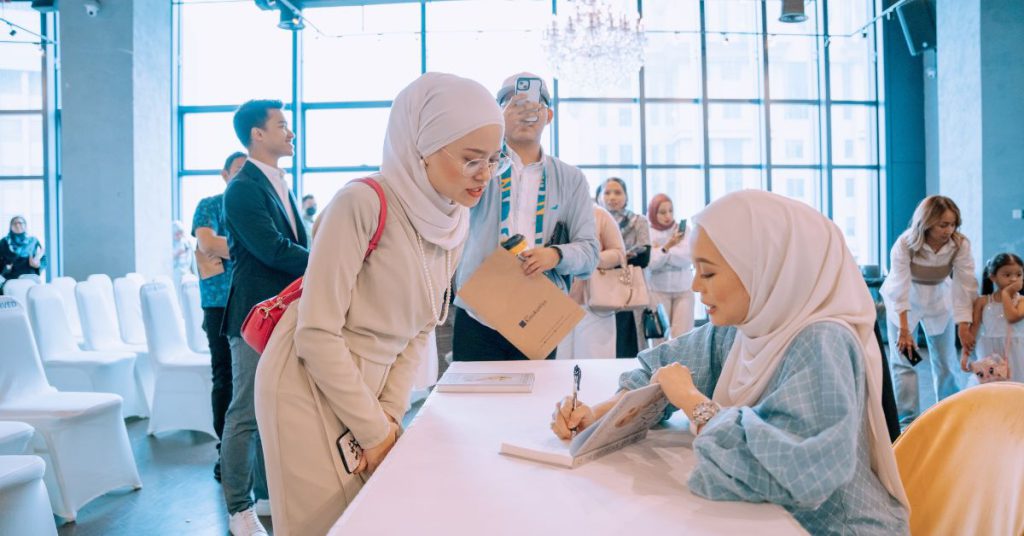
“But at the end of the day, mentors always tell us if something doesn’t work, end it fast,” Vivy said. “We had our duty to the overall business to make sure the growth was healthy and profitable, so if we just can’t make something profitable, as entrepreneurs, we had to bite the bullet and let it go.”
Vivy also shared that there was a transition committee at FashionValet and a detailed plan in place. The team purposely wanted it to be a gradual transition, as she believes no change should be a sudden and abrupt one.
Why was there no public statement when FashionValet shut down?
Believing that a more complete brand experience for both dUCk and LILIT. would require their own websites and apps, the team thought it would be best to introduce the customers to those platforms, while still keeping FashionValet’s website up and running so the customer experience wouldn’t see an abrupt change.
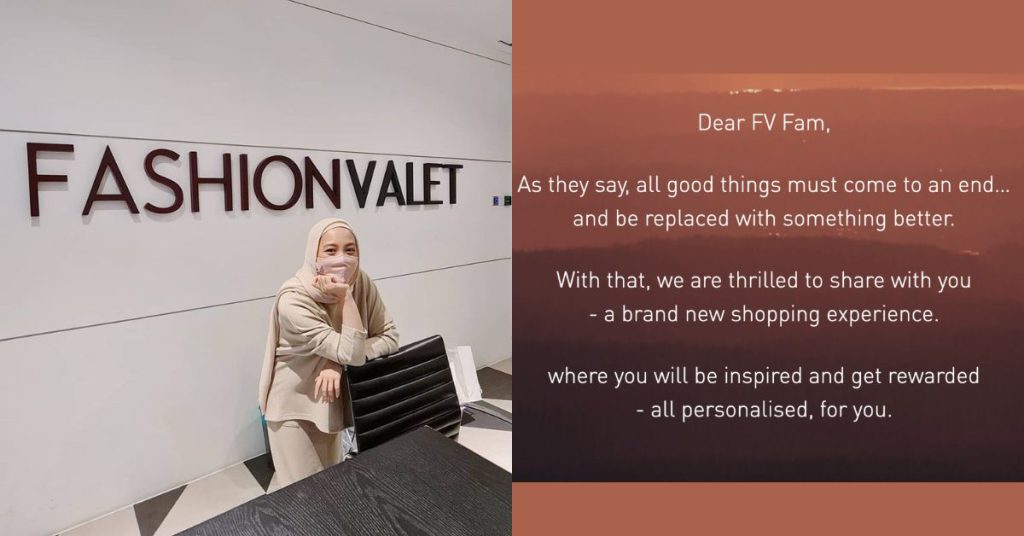
“By the time we announced [the closure] on the FV website, 90% of our customers had already migrated to the brands’ websites/apps so we were confident no major announcement was needed,” Vivy shared.
She believes that the speculations that came were mostly outside of the brands’ customer base, from “a couple of detractors wanting to create a bigger drama”.
“Business unit pivots are common in any company, but the nature of my public persona is that it would be amplified and I accept that,” she said. “I tried my best to answer every query, and we did this with a lot of media interviews.”
How has the company been doing after this pivot?
“Our profitability has definitely improved and now we are focused on scaling the brands to a global level,” Vivy told us.
“However, we were hit shortly after by the worst times for retail industry—pandemic, inflation, the war in Ukraine affecting the supply chain, rising oil prices that affected all our costs.”
While these things have affected the group’s plans, Vivy shared that the team is ready to scale once the market improves.
As for now, Vivy has no comment on any future plans (whether it be IPO, expansions, or whatever else), but promised to keep us posted on any news.
What will the next decade look like?
Even the title of the book, The First Decade, makes for a perfect lead-up for another title, perhaps The Second Decade?
Well, it might be a little too soon to say.
“After almost a two-year process of writing and launching this book, I’m just enjoying the fruits of my labour,” Vivy said.
The entrepreneur has had a book tour in Malaysia, and recently in Singapore. Moving forward, she shared that she is just excited to launch the book in other markets and meet the readers there as well.
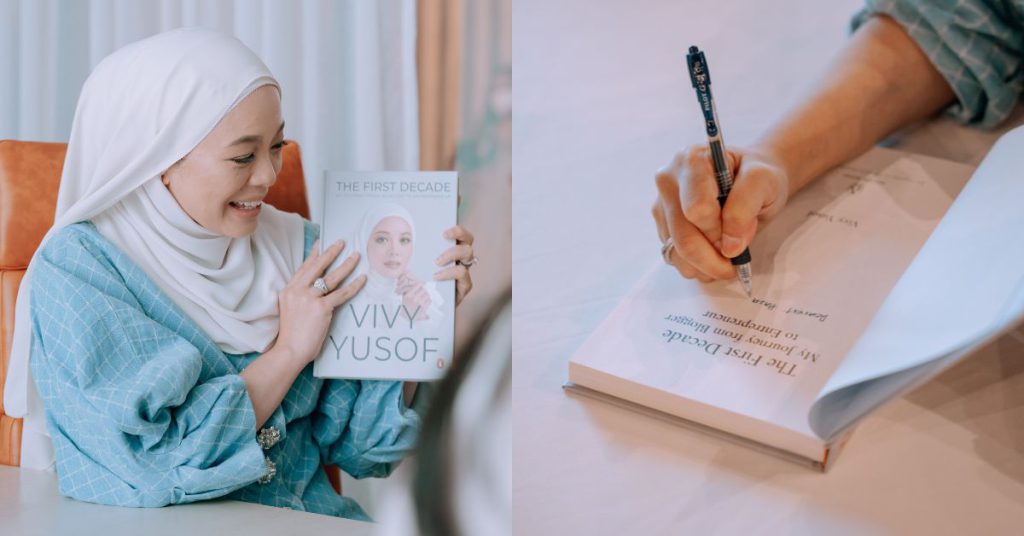
This is especially as she wants The First Decade to be a global book that entrepreneurs everywhere can relate to.
“Having said that, I love writing and wouldn’t be surprised if I wake up one day wanting to write another book, so we’ll see!”
While erring on the side of caution in terms of the global market, Vivy shared that the company will promise an equally exciting array of modest fashion collections and collaborations for both dUCk and LILIT. this year.
The group has just completed a major tech revamp across its websites and apps, and will be rolling out new features to further merge and integrate its online and offline experience.
“As our vision is to become a global group of modest fashion brands servicing a potential of one billion Muslim females out there, we are always on the lookout to invest in other brands that fit our ambitions and value,” she concluded.
At the end of our interview, she quipped that if there were any interested companies, her Instagram DMs are always open.
- Learn more about The First Decade: My Journey from Blogger to Entrepreneur here.
- Read more articles we’ve written about Vivy Yusof here.
Featured Image Credit: Vivy Yusof











